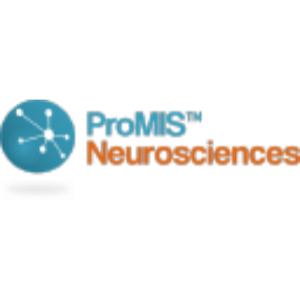ProMIS Neurosciences to Showcase PMN310’s Ability to Target Toxic Oligomers and Distinguish from Other Amyloid-Beta Oligomers in Preclinical Studies at the 4th International Conference on Cognitive & Behavioral Neurosciences
Rhea-AI Summary
ProMIS Neurosciences (Nasdaq: PMN) will present preclinical data on its lead product candidate, PMN310, at the 4th International Conference on Cognitive & Behavioral Neurosciences. The data supports PMN310's potential as an Alzheimer's disease treatment, highlighting its enhanced selectivity for toxic amyloid-beta oligomers (AßO). Key findings show:
1. PMN310 demonstrates little to no interaction with monomers
2. It's minimally impacted by excess monomer competition in binding to toxic oligomers
3. PMN310 doesn't bind to Aß plaque or vascular deposits
These characteristics could potentially reduce the risk of amyloid-related imaging abnormalities (ARIA). ProMIS recently reported positive topline data from the first four cohorts in its Phase 1a trial of PMN310, meeting objectives for tolerability, safety, and pharmacokinetics. The company plans to advance PMN310 into a Phase 1b study in Q4 2024.
Positive
- PMN310 shows enhanced selectivity for toxic amyloid-beta oligomers in preclinical studies
- PMN310 demonstrates little to no interaction with monomers, potentially improving efficacy
- The antibody doesn't bind to Aß plaque or vascular deposits, potentially reducing ARIA risk
- Positive topline data from Phase 1a trial met objectives for tolerability, safety, and pharmacokinetics
- Company on track to advance PMN310 into Phase 1b study in Q4 2024
Negative
- None.
News Market Reaction 1 Alert
On the day this news was published, PMN gained 1.63%, reflecting a mild positive market reaction.
Data tracked by StockTitan Argus on the day of publication.
CAMBRIDGE, Massachusetts and TORONTO, Ontario, Sept. 12, 2024 (GLOBE NEWSWIRE) -- ProMIS Neurosciences Inc. (Nasdaq: PMN), a biotechnology company focused on the generation and development of antibody therapeutics targeting toxic misfolded proteins in neurodegenerative diseases such as Alzheimer’s disease (AD), amyotrophic lateral sclerosis (ALS) and multiple system atrophy (MSA), today announced that preclinical data supporting the potential role of its lead product candidate, PMN310, as a treatment for AD will be highlighted in an oral presentation at the 4th International Conference on Cognitive & Behavioral Neurosciences (ICBN) taking place from September 12-13, 2024 in Lisbon, Portugal.
A large body of evidence indicates that the most pathogenic species of amyloid-beta (Aß) in AD consists of soluble toxic oligomers as opposed to insoluble fibrils and monomers. The ability of a therapeutic antibody to target toxic amyloid-beta oligomers (AßO) without being diverted by binding to competing non-toxic species has the potential to result in greater efficacy. As a next generation antibody, PMN310 is a therapeutic candidate designed to target toxic oligomers more selectively.
“The data being shared at ICBN further support PMN310 as a potential treatment for AD due to its enhanced selectivity for toxic oligomers” stated Johanne Kaplan, Ph.D., Chief Development Officer of ProMIS Neurosciences and platform presenter. “Importantly, the ability of PMN310 to avoid interaction with plaque and vascular deposits of amyloid-beta could potentially reduce the risk of amyloid-related imaging abnormalities, or ARIA, a dose-limiting toxicity associated with plaque-binding antibodies.”
In the studies, the binding of PMN310 and other Aß-directed antibodies to a toxic oligomer-enriched low molecular fraction of brain extract from AD patients was evaluated by surface plasmon resonance, with and without monomer competition. The results indicated that PMN310 showed little or no interaction with monomers and was among the least impacted by excess monomer competition in binding to toxic oligomers in AD brain extract. Additionally, PMN310 did not bind to Aß plaque or vascular deposits as determined by immunohistochemistry. These results highlight how PMN310 distinguishes itself from other Aß-directed antibodies and may potentially provide an improved product profile with enhanced efficacy.
Details of the oral presentation are as follows:
Title: Distinguishing between amyloid-beta directed antibodies: Ability of PMN310 to target toxic oligomers despite competing species
Date/Time of Virtual Presentation: Friday, September 13 at 2:00pm WEST (6:00am PT / 9:00am ET)
Authors: Johanne Kaplan, Ebrima Gibbs, Juliane Coutts, Beibei Zhao, Neil R. Cashman
The slide presentation is available on the Posters and Publications page of the Company’s website at www.promisneurosciences.com.
In July 2024, ProMIS Neurosciences reported positive topline data from the first four cohorts in its first-in-human Phase 1a clinical trial of PMN310, demonstrating that it met objectives for tolerability, safety and pharmacokinetics. The Company expects to report topline results from all five cohorts [in the coming months] and is on-track to advance PMN310 into a Phase 1b study in the fourth quarter of 2024.
About PMN310
PMN310 is a humanized monoclonal antibody (mAb) designed and developed based on its selectivity for soluble amyloid beta oligomers (AβOs), which ProMIS believes are the most toxic and pathogenic form of Aβ, relative to Aβ monomers and amyloid plaque. Soluble AβOs have been observed to be potent neurotoxins that bind to neurons, inhibit synaptic function and induce neurodegeneration. By selectively targeting toxic soluble AβOs, PMN310 aims to directly address the growing body of evidence suggesting that they represent a primary underlying cause of the neurodegenerative process in Alzheimer’s disease.
About ProMIS Neurosciences Inc.
ProMIS Neurosciences Inc. is a clinical stage biotechnology company focused on generating and developing antibody therapeutics selectively targeting toxic misfolded proteins in neurodegenerative diseases such as Alzheimer’s disease (AD), amyotrophic lateral sclerosis (ALS) and multiple system atrophy (MSA). The Company’s proprietary target discovery engine applies a thermodynamic, computational discovery platform - ProMIS™ and Collective Coordinates - to predict novel targets known as Disease Specific Epitopes on the molecular surface of misfolded proteins. Using this unique approach, the Company is developing novel antibody therapeutics for AD, ALS and MSA. ProMIS has offices in Toronto, Ontario and Cambridge, Massachusetts.
Forward-Looking Statements
This press release contains forward-looking statements that are made pursuant to the safe harbor provisions of the Private Securities Litigation Reform Act of 1995. Certain information in this news release constitutes forward-looking statements and forward-looking information (collectively, “forward-looking information”) within the meaning of applicable securities laws. In some cases, but not necessarily in all cases, forward-looking information can be identified by the use of forward-looking terminology such as “plans”, “excited to”, “targets”, “expects” or “does not expect”, “is expected”, “an opportunity exists”, “is positioned”, “estimates”, “intends”, “assumes”, “anticipates” or “does not anticipate” or “believes”, or variations of such words and phrases or state that certain actions, events or results “may”, “could”, “would”, “might”, “will” or “will be taken”, “occur” or “be achieved”. In addition, any statements that refer to expectations, projections or other characterizations of future events or circumstances contain forward-looking information. Specifically, this news release contains forward-looking information relating to the Company’s preclinical data, novel vaccine approach to target toxic oligomers and the potential implications thereof, the Company's expectations regarding its clinical development of its lead product, PMN310, for AD, and the Company’s plans to announce additional results and advance into a Phase 1b multiple ascending dose study in AD patients. Statements containing forward-looking information are not historical facts but instead represent management's current expectations, estimates and projections regarding the future of our business, future plans, strategies, projections, anticipated events and trends, the economy and other future conditions. Forward-looking information is necessarily based on a number of opinions, assumptions and estimates that, while considered reasonable by the Company as of the date of this news release, are subject to known and unknown risks, uncertainties and assumptions and other factors that may cause the actual results, level of activity, performance or achievements to be materially different from those expressed or implied by such forward-looking information, including, but not limited to, the risk that the results of nonclinical studies and early clinical trials are not necessarily predictive of future results with PMN310, the Company’s ability to fund its operations and continue as a going concern, its accumulated deficit and the expectation for continued losses and future financial results. Important factors that could cause actual results to differ materially from those indicated in the forward-looking information include, among others, the factors discussed throughout the “Risk Factors” section of the Company's most recently filed Annual Report on Form 10-K for the year ended December 31, 2023 and in its subsequent filings filed with the United States Securities and Exchange Commission. Except as required by applicable securities laws, the Company undertakes no obligation to publicly update any forward-looking information, whether written or oral, that may be made from time to time, whether as a result of new information, future developments or otherwise.
For further information:
Visit us at www.promisneurosciences.com
Please submit media inquiries to info@promisneurosciences.com.
For Investor Relations, please contact:
Precision AQ (formerly Stern IR)
Anne Marie Fields, Managing Director
annemarie.fields@precisionaq.com
Tel. 212-362-1200







